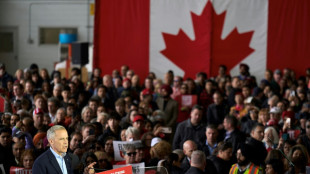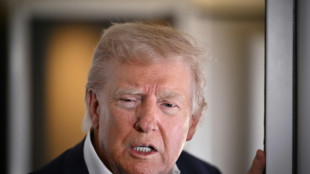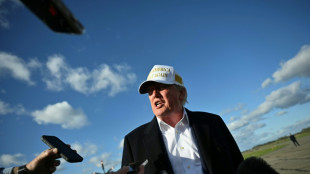-
 Palestinian official tells ICJ Israel using aid blockage as 'weapon of war'
Palestinian official tells ICJ Israel using aid blockage as 'weapon of war'
-
France arrests 25 in police raids after prison attacks

-
 Kim Kardashian's next star turn is in a Paris courtroom
Kim Kardashian's next star turn is in a Paris courtroom
-
Syria group says military chief arrested in UAE

-
 Anger in Indian Kashmir at demolitions and detentions
Anger in Indian Kashmir at demolitions and detentions
-
Italy bank merger wave heats up as Mediobanca eyes Banca Generali

-
 Putin critic Johann Wadephul, Germany's incoming foreign minister
Putin critic Johann Wadephul, Germany's incoming foreign minister
-
Cardinals expected to pick conclave date to elect new pope

-
 French mosque murder suspect arrested in Italy
French mosque murder suspect arrested in Italy
-
China says on 'right side of history' in trade standoff with US

-
 Stock markets mostly rise as investors eye trade talks
Stock markets mostly rise as investors eye trade talks
-
Fires rage 2 days after Iran port blast killed 40

-
 Yemen's Huthi rebel media says 68 killed in US strikes on migrant centre
Yemen's Huthi rebel media says 68 killed in US strikes on migrant centre
-
Man rescued from Mount Fuji twice in one week: reports

-
 Canada votes for new government to take on Trump
Canada votes for new government to take on Trump
-
Top UN court to open hearings on Israel's aid obligation to Palestinians

-
 Philippines denies 'irresponsible' Chinese report on disputed reef
Philippines denies 'irresponsible' Chinese report on disputed reef
-
T'Wolves win to push Lakers to brink, Celtics, Knicks and Pacers win

-
 Myanmar marks month of misery since historic quake
Myanmar marks month of misery since historic quake
-
South Korea's SK Telecom begins SIM card replacement after data breach

-
 Women's flag football explodes in US as 2028 Olympics beckon
Women's flag football explodes in US as 2028 Olympics beckon
-
'Hunger breaks everything': desperate Gazans scramble for food

-
 Suspect charged with murder in Canada car attack that killed 11
Suspect charged with murder in Canada car attack that killed 11
-
Lost to history: Myanmar heritage falls victim to quake

-
 Romania far-right rides TikTok wave in election re-run
Romania far-right rides TikTok wave in election re-run
-
Trial begins in Paris over 2016 gunpoint robbery of Kim Kardashian

-
 Trump thinks Zelensky ready to give up Crimea to Russia
Trump thinks Zelensky ready to give up Crimea to Russia
-
North Korea confirms troop deployment to Russia's Kursk

-
 Romania presidential election re-run under Trump shadow
Romania presidential election re-run under Trump shadow
-
Asian markets mixed as investors eye trade talks

-
 T'Wolves push Lakers to brink of elimination, Celtics and Knicks win
T'Wolves push Lakers to brink of elimination, Celtics and Knicks win
-
Suspect charged with murder in Canada car attack that left 11 dead

-
 Smart driving new front in China car wars despite fatal crash
Smart driving new front in China car wars despite fatal crash
-
Cardinals set to pick conclave date to elect new pope

-
 Miami's unbeaten MLS run ends after Dallas comeback
Miami's unbeaten MLS run ends after Dallas comeback
-
After 100 days in office, Trump voters still back US president

-
 US anti-disinformation guardrails fall in Trump's first 100 days
US anti-disinformation guardrails fall in Trump's first 100 days
-
Dick Barnett, two-time NBA champ with Knicks, dies at 88

-
 PSG hope to have Dembele firing for Arsenal Champions League showdown
PSG hope to have Dembele firing for Arsenal Champions League showdown
-
Arteta faces Champions League showdown with mentor Luis Enrique

-
 Niemann wins LIV Mexico City to secure US Open berth
Niemann wins LIV Mexico City to secure US Open berth
-
Slot plots more Liverpool glory after Premier League triumph

-
 Novak and Griffin win PGA pairs event for first tour titles
Novak and Griffin win PGA pairs event for first tour titles
-
Q2 Metals Extends Mineralized Zone Strike Length to 1.5 Kilometres and Concludes the 2025 Winter Program at the Cisco Lithium Project in Quebec, Canada

-
 Empire Metals Limited - Extensive High-Grade Titanium Zones Confirmed
Empire Metals Limited - Extensive High-Grade Titanium Zones Confirmed
-
Hemogenyx Pharmaceuticals PLC Announces Final Results

-
 Inter Miami unbeaten MLS run ends after Dallas comeback
Inter Miami unbeaten MLS run ends after Dallas comeback
-
T'Wolves rally late to beat Lakers, Knicks edge Pistons amid controversy

-
 Japan's Saigo wins playoff for LPGA Chevron title and first major win
Japan's Saigo wins playoff for LPGA Chevron title and first major win
-
Trump tells Putin to 'stop shooting' and make a deal

DOGE Fails to Slash U.S. Spending
The Department of Government Efficiency (DOGE), launched with bold promises to revolutionize federal spending, has fallen dramatically short of its ambitious goals, raising questions about its effectiveness and impact on the U.S. budget. Tasked with streamlining government operations and slashing what its proponents called wasteful expenditure, DOGE was heralded as a transformative force. Yet, recent developments reveal a stark reality: the initiative has failed to deliver meaningful spending cuts, leaving its lofty objectives unfulfilled and critics pointing to mismanagement and inflated claims.
Initially, DOGE set out with a headline-grabbing target of reducing federal spending by $2 trillion, a figure that captured public attention and underscored the initiative’s audacious vision. This goal was later halved to $1 trillion, signaling early challenges in identifying viable cuts without disrupting essential services. More recently, reports indicate that the projected savings have dwindled to a fraction of the original promise, with estimates suggesting only $150 billion in reductions—a mere 7.5% of the initial target. Even this figure has faced scrutiny, with analysts arguing that the actual savings may be significantly lower due to questionable accounting methods and speculative projections.
One of the core issues plaguing DOGE has been its approach to identifying efficiencies. The initiative aimed to eliminate redundant contracts, streamline federal agencies, and reduce bureaucratic overhead. However, the execution has been chaotic, with cuts often appearing indiscriminate rather than strategic. For instance, reductions in consulting contracts, particularly in defense and IT services, were touted as major wins, yet many of these contracts supported critical government functions. The abrupt termination of such agreements has led to operational disruptions, forcing agencies to scramble for alternatives or reinstate services at additional cost.
Moreover, DOGE’s efforts have sparked unintended consequences across federal agencies. Staff reductions, intended to shrink the workforce, have instead triggered inefficiencies, with remaining employees struggling to handle increased workloads. This has been particularly evident in agencies responsible for public services, where understaffing has led to delays and diminished service quality. The ripple effects extend beyond government operations, impacting private-sector contractors who relied on federal partnerships. Layoffs in consulting firms and other industries tied to government contracts have further eroded confidence in DOGE’s strategy.
Critics argue that DOGE’s aggressive push for cuts overlooked the complexity of federal budgeting. Many targeted programs, such as grants for cultural institutions or international development, represent a tiny fraction of the budget but deliver outsized benefits in terms of public goodwill and long-term economic gains. Eliminating these programs has yielded negligible savings while generating significant backlash. Similarly, attempts to overhaul agencies like the Social Security Administration have raised alarms about potential disruptions to benefits, undermining public trust in the initiative’s priorities.
The leadership behind DOGE has also come under fire. High-profile figures driving the initiative were expected to bring private-sector ingenuity to government reform. Instead, their lack of experience in public administration has led to missteps, including overestimating the ease of implementing cuts and underestimating the resistance from entrenched bureaucratic systems. Public perception has soured as well, with polls indicating growing skepticism about DOGE’s ability to deliver on its promises without harming essential services.
Financially, the broader context paints a grim picture. While DOGE aimed to curb deficits, the federal debt continues to climb, projected to exceed $36 trillion in the coming years. Tax cuts passed concurrently with DOGE’s efforts are expected to add trillions more to the deficit, offsetting any savings the initiative might achieve. This contradiction has fueled accusations that DOGE was more about political optics than genuine fiscal responsibility.
Looking ahead, DOGE’s future remains uncertain. With its initial timeline nearing its end, pressure is mounting to demonstrate tangible results. Supporters argue that the initiative has at least sparked a conversation about government waste, laying the groundwork for future reforms. However, without a clear pivot to more targeted, evidence-based strategies, DOGE risks being remembered as a cautionary tale of overambition and underdelivery.
In the end, the Department of Government Efficiency has not lived up to its billing as a budget-cutting juggernaut. Its inability to achieve meaningful spending reductions, coupled with operational missteps and public skepticism, underscores the challenges of reforming a sprawling federal system. As the U.S. grapples with fiscal challenges, the DOGE experiment serves as a reminder that bold promises must be matched by careful execution.

Scientists: "Mini organs" from human stem cells

ICC demands arrest of Russian officers

Europe and its "big" goals for clean hydrogen

Putin and the murder of Alexei Navalny (47†)

Measles: UK authorities call for vaccinate children

EU: Von der Leyen withdraws controversial pesticide law

EU: Prison for "paedophilia manuals" and child abuse forgeries

EU: 90% cut of all greenhouse gas emissions by 2040?

How is climate change spreading disease?

Business: Is it important to speak multiple languages?

Trump's return could leave Europe 'on its own'



